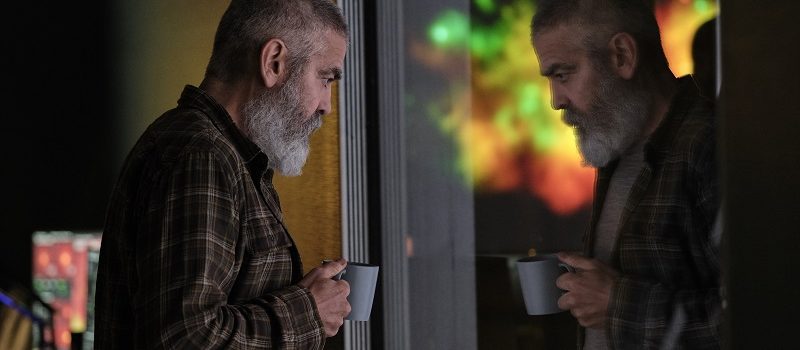George Clooney has directed seven films and even won two Oscars for his acting and producing efforts. Look for his latest to earn him on that esteemed list of Best Director nominees. What is remarkable is that everything he has done up until this point has all led to this, The Midnight Sky. The science-fiction drama is based on the book by Lily Brooks-Dalton and follows two paths—one in space and another on earth, both are perilous to say the least.
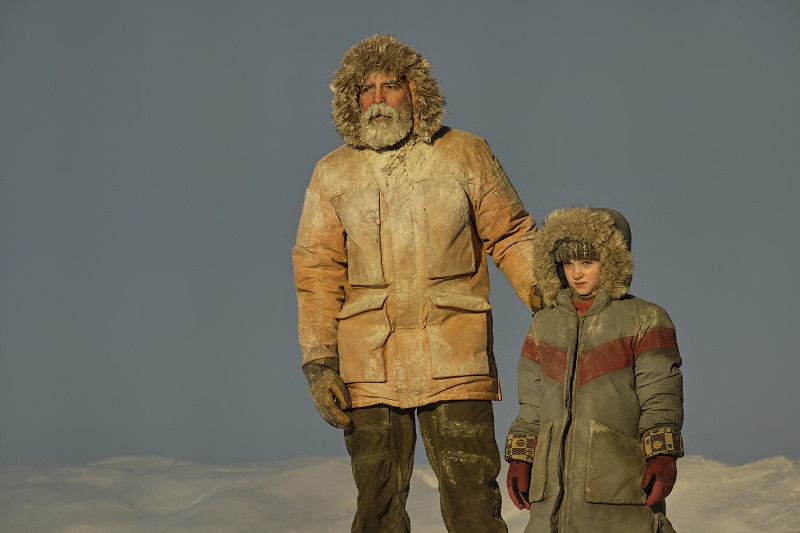
There is an urgency that is immediately palpable. The fate of the world hangs in the balance. A spaceship, the Æther, is on its way back from a mission to Jupiter where it has been discovered there is a moon that can sustain life. Just in time too because the earth is not doing so well. In fact, as the Æther is on her home journey, a mysterious situation blankets the planet and kills practically everything. Clooney’s lone scientist is at an Arctic base, and his Augustine must get in touch with the ship and inform them not to come home—to return to K-23 and to start a life to save humanity. The problem is the radio system he’s using at the base is not working and there is a stronger signal miles away across a frozen tundra that could possibly reach the crew and prevent them from arriving on an inhabitable planet.
Clooney is vital to this endeavor being successful, as successful as one can be after an apocalypse. Witnessing him alone in the Artic base where we know that the ship has not heard from mission control in over three weeks, is vital. Getting that signal to the ship is imperative. Meanwhile, on the ship, the scientists and astronauts have mixed feelings about going back to earth. On one hand, they have more answers than questions about the mission and that is a good thing. On the other hand, why haven’t they heard from the earth in three weeks? What is going on down there and will there be an earth to return to?
Top to bottom, The Midnight Sky is a highly effective adventure into the human spirit as we have seen in some time. Its characters may be light years away from each other, but there is a common bond that connects them that is inescapable. It’s a tether that is simple when all is said and done—they’re all human and share a desire to not only survive but to thrive and to be embraced by the love of family and friends.
It’s a beautiful metaphor for where we are now as a society. Isolated, but connected in the goal of one day being able to rejoin each other and continue the miracle that is the promise of the human race.
Aboard the Æther is a diverse group of folks who are basking in what has largely been a successful mission. They found a habitable planet for earthlings to move to should the time arise. They also have more answers than questions, which seems to be a rarity in the sci-fi genre. Yet, there is a darkness that is ever creeping over the ship that something extraordinarily awful has happened on their home planet that has produced nothing but questions.
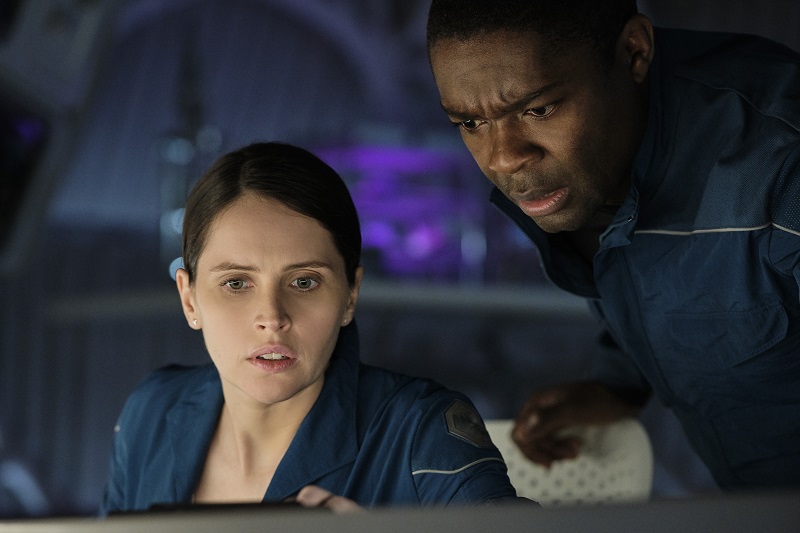
Felicity Jones is Sully, and she is a fierce space traveler, whose commitment to the mission is unwavering. She is quite concerned about the lack of communication with Mission Control, or anyone on Earth for that matter. But she has her own internal issues that only burrow to the surface when the plot warrants it and not one second sooner. It’s a masterful stroke of story engineering by screenwriter Mark L. Smith (adapted from the Brooks-Dalton book, Good Morning, Midnight). It is wizardry he wields around every turn and in every possible emotional, tense, and thrilling corner.
Jones is intense, further showcasing the talents of the UK thespian. Yet she also firmly wears her heart on her sleeve. We may not hear her emotive thoughts, but we sense them through her body language, facial gestures, and general arrested sense of success that should be overflowing those on this mission.
Oyelowo’s Adewole is as steady as they come. He knows he’s facing the direst of possibilities, but all the while he is providing a stable hand for the crew. The actor is exemplary in the part and has a quiet fierceness that is filled with optimism meets reality. He couldn’t be more perfectly cast.
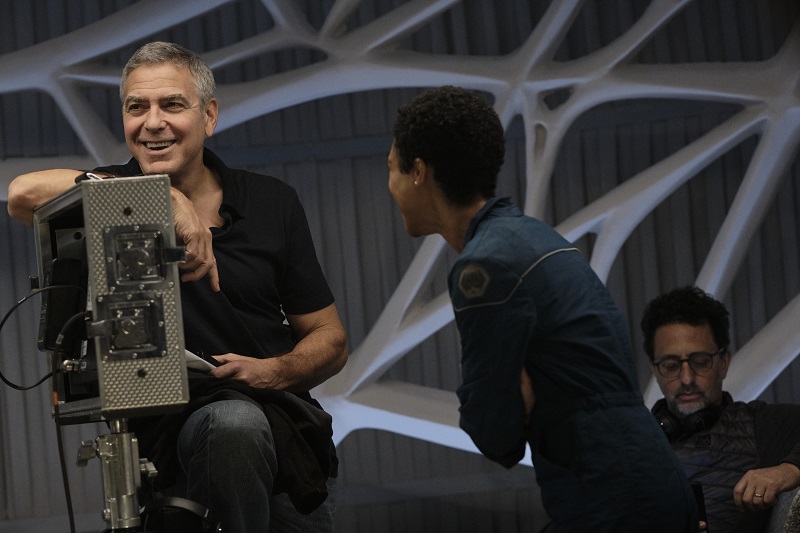
Supporting those two are Kyle Chandler’s Mitchell and Damian Bichir’s Sanchez. Each has a connection to Earth that may be more evident than the other crew members. Some are spoken, some are seen, and others are inferred. All told, these two share a connection that is as ethereal as it is firmly earthbound. How they approach the impending doom is a study in steadfastness meets warranted selfishness.
Clooney puts on a show, on both sides of the camera. As a director, he has grown leaps and bounds. You know he learned a few things on the set of Gravity, and one can see those come to life, such as the spacewalk scene—where the crew shockingly encounters an out-of-nowhere meteor shower! Talk about tension. Clooney, on earth, is flying solo, except for a darling little girl (Iris, played with quiet impeccability by Caoiilinn Springall) who we don’t care if she’s real or an amalgamation of several someones who are or were important to the veteran scientist.
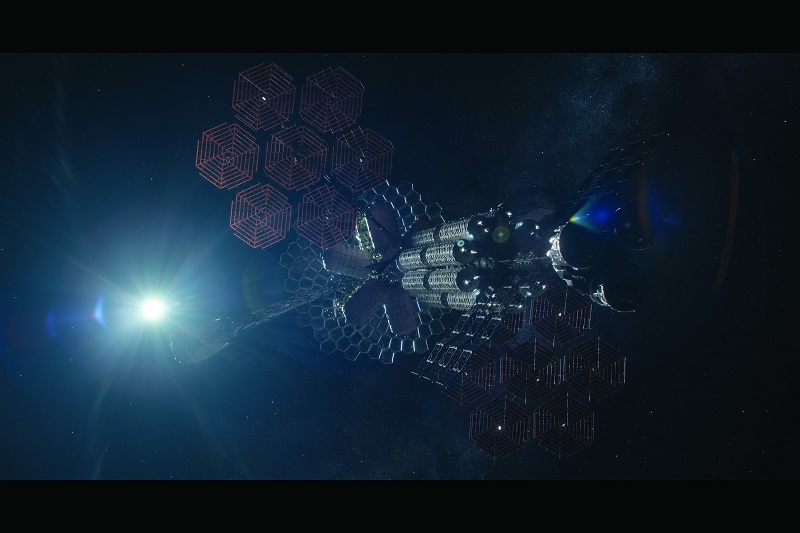
What the actor achieves in his Arctic prison is ironically out of this world, given the context of his film. To handle the demands of directing, all while turning in a performance that is also one of his best, is simply astounding.
Clooney has a gift, and it may have taken some years to hone it, there is no question that this guy (and his team) have absolutely joined the list of the world’s most gifted tale-tellers.
There are countless moments of desperation on the ground for the actor. Clooney’s scientist has decades of experiences that have led him to this very moment, but it appears that almost none of it matters at this current point in time. The key to the success of his, and their mission, lies in his ability to be a basic human being clinging to the hope of survival.
Grade: A+

